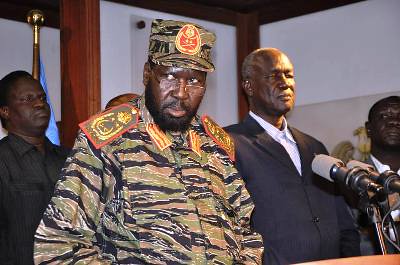
Republic South Sudan President Salva Kiir with Defense Minister Koul Manyang Juuk announcing that an attempted coup has taken place. He blamed former Vice President Riek Machar., a photo by Pan-African News Wire File Photos on Flickr.
TUESDAY 18 FEBRUARY 2014
South Sudan president admits forming private army
February 17, 2014 (JUBA) - South Sudan’s president, Salva Kiir, has admitted forming a private army widely believed to have played a key role in ethnic killings after clashes broke out between rival factions within the presidential guard on 15 December.
Kiir made the surprise admission at a political function organised by the youth wing of the governing Sudan People’s Liberation Movement (SPLM) in the capital, Juba, on Saturday.
The president attempted to justify the formation of the unauthorised army, saying the intention was to have “a reserve force” to help the nation in the event military action was needed.
“It was on this basis that somebody mobilised and recruited some youth to the national service. Those who thought of mobilisation of the youth to be trained did not have bad intention. It was not a bad idea. Any country which does not have [a] reserve [force] always gets into difficulties”, Kiir told the audience at the meeting.
He accused some officials of having denied the new recruits their salaries and weapons while undergoing training as they were opposed to the idea.
“When these people were in the training, they were denied everything. They were denied salaries, weapons and all the things they were supposed to get because some people did not like the idea, but when this thing (the outbreak of violence) happened, they did not think about all that happened to them. Who are now fighting in Unity, in Malakal and Jonglei states?” Kiir said.
The gathering was attended by high-ranking government officials and members of the SPLM’s leadership council.
Vice-president James Wani Igga also addressed the gathering, which was attended by the speaker of the national parliament, Magok Rundial, as well as senior military officers and members from other political parties in the country.
Close to half a million people have been displaced since the conflict broke out in Juba, quickly spreading to other parts of the country as government troops loyal to Kiir and rebels aligned with former vice-president Riek Machar battled for control of strategic areas.
The conflict divided along ethnic lines, pitting members of Kiir’s Dinka tribe against supporters of Machar, who hails from the Nuer tribe.
Human Rights Watch (HRW) said a research team had documented widespread killings of Nuer men by members of the South Sudan army (SPLA) in Juba, particularly during the period between 15 to 19 December, including a massacre of between 200 and 300 men in the Gudele neighbourhood, after they were reportedly rounded up and forced into an overcrowded room in a government building before being shot.
Eyewitnesses and victims gave accounts of soldiers and policemen conducting house-to-house searches in the capital for Nuer men.
HRW also documented the targeting and killing of civilians of Dinka ethnicity by opposition forces in other parts of the country during the conflict.
(ST)
No comments:
Post a Comment